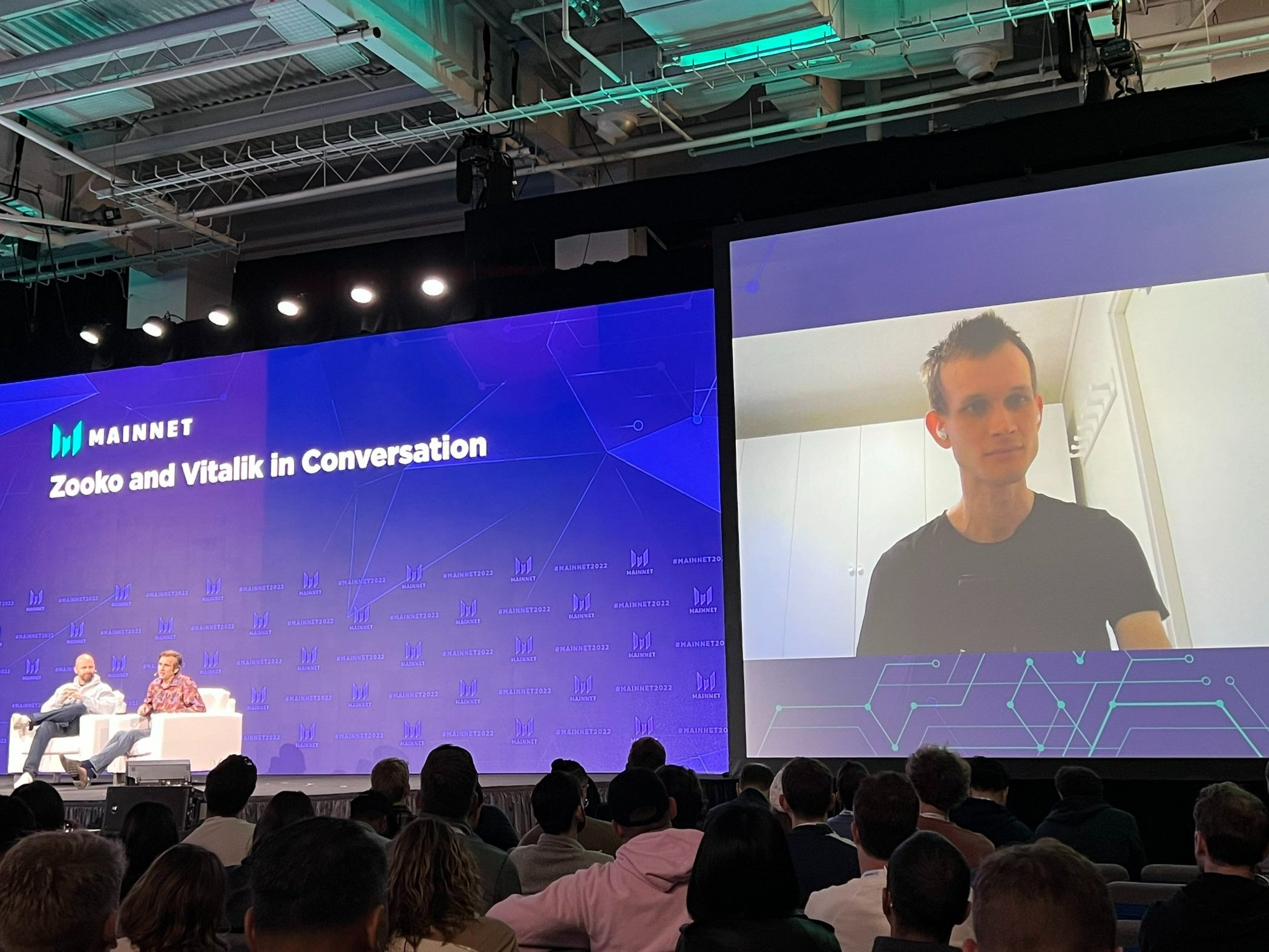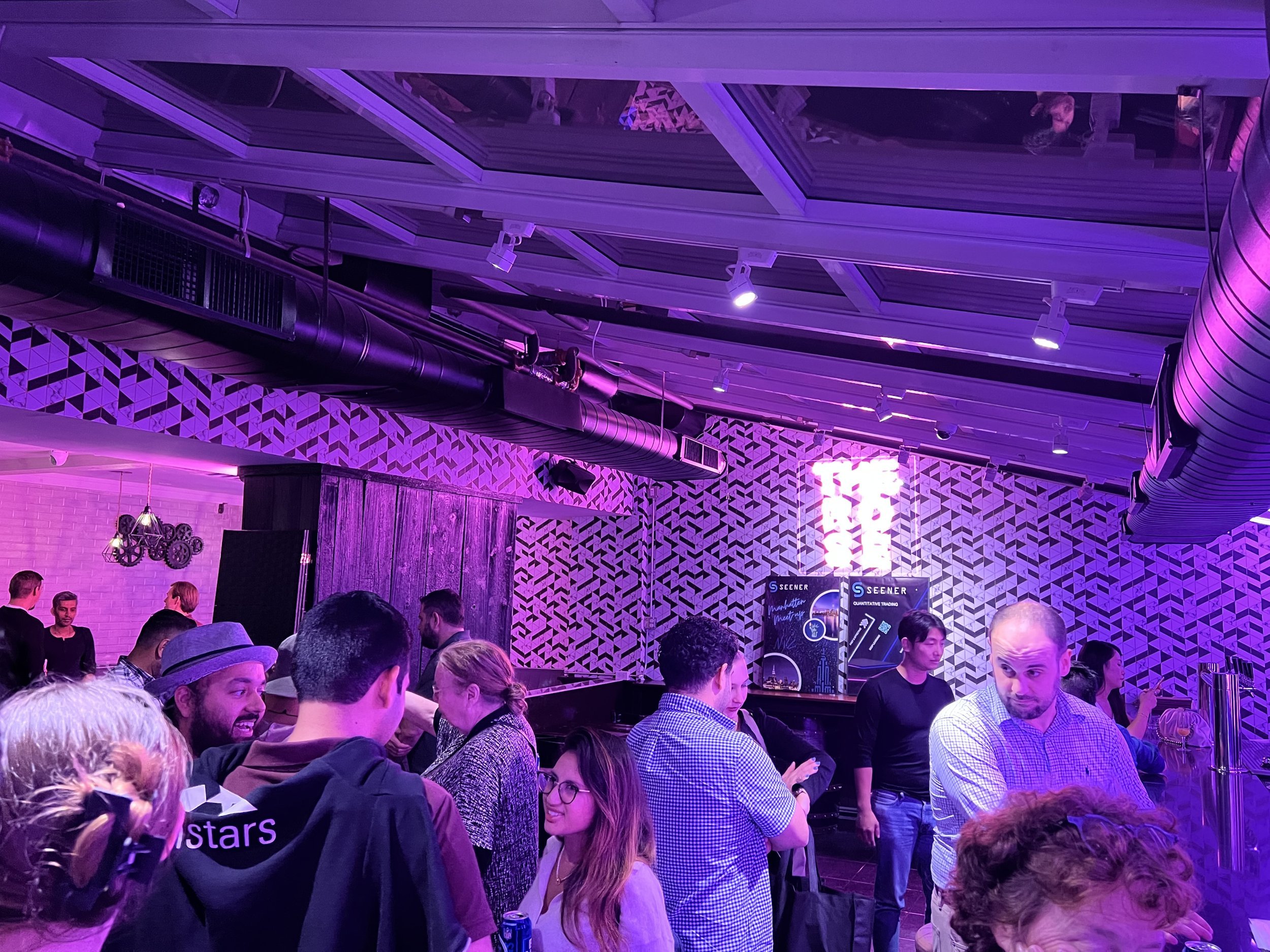Postcard from Messari’s NYC Mainnet: Crypto Enthusiasts to Corporate Execs, A Meeting of All Minds
A roundup of some of the most interesting goings on at Messari’s NYC Mainnet conference

For a moment, I thought I walked into the wrong room. Granted, Messari’s Mainnet conference in New York City contained its fair share of weirdos and strangely dressed attendees, but this still caught the eye. One of the panelists was decked out in a t-shirt that declared “Privacy is normal.” His cap read “privacy” and his sneakers sang Silicon Valley.
The session was titled “What it’s like being a Web3 fan at a Web2 giant” and the moderator went straight to the ‘privacy’ guy – obviously just as curious as I.
It was Yorke Rhodes, Microsoft’s director of digital transformation, blockchain and cloud supply chain. Smiling, he knew he was a walking wardrobe paradox. Big tech preaching privacy, sitting alongside Google and Instagram execs.
“I only found two vendors in the expo who had privacy swag or else I’d be wearing more,” he said. “The idea that consumers should own their data and have privacy over their online identity as a core principle is extremely important.”
He went on, “Aside from ownership, I like to describe the phenomenon in web3 is the ability to define digital uniqueness on a global domain. It’s not something we’ve had in technology before. This has huge technical ramifications for business models and how we think about building apps to serve creators and consumers. Web3 is a huge opportunity for the entire internet ecosystem.”
Rhodes said the principles of decentralization are crucial to achieve scale without creating walled gardens. “While we can’t build highly scalable apps such as Instagram without something like cloud, we can get the three major cloud vendors working together to ensure there isn’t density on one versus the other.”
The conversation touched on the various ways we’ll engage, whether it’s in virtual reality, via desktop, on mobile or in real life, and how they’ll need to converge into one singular identity. It’s about privacy, remember. The closed metaverses can be compared to the silos of web2.
We still have a way to go.
The afterglow of the Merge
While Rhodes is well known to the Ethereum blockchain community and is a staple at large conferences, it still felt hugely ironic to have a Microsoft exec decked out privacy paraphernalia.
Big tech in privacy gear marked a sign of the times, a maturing of the space. Post-Merge, you could feel the collective confidence. “I’m just happy our session didn’t overlap with Vitalik Buterin,” one panelist said, as he noticed people peeling out the back of the room. No surprises, Vitalik’s keynote filled the main stage.
Moderator Ryan Selkis, the founder of Messari, kicked off the conversation saying the Merge was one of the most important and challenging technical upgrades in software history. The crowd cheered and whistled in agreement.
Zooko Wilcox was the perfect co-host, with his “back in the old days” stories with Vitalik, as the two met before Ethereum launched. “Remember when we were both enthusiastic Bitcoiners,” he said, making Vitalik smirk. He pulled up a tweet documenting his early skepticism of the Merge, which said he was “waiting to see what goes wrong.”
Read more: Q&A With Ethereum Inventor Vitalik Buterin
Vitalik held the audience’s attention, as he talked about how smooth the transition went and how “the sky that has been cloudy for almost a decade has finally cleared.”
Buterin said the Ethereum community was now moving on to a part of their roadmap called “the Surge,” or increasing the capacity of transactions the chain can process. “Unlike the Merge, the Surge will happen in small stages,” he said. We can look forward to transactions getting cheaper and cheaper, Buterin promised.
The conversation moved into topics of privacy improvement, censorship resistance, and crypto’s most pressing issues, before swinging back to the Merge and its important milestone in de-risking crypto.
A turning point in crypto
The quantum leap in optimism permeated the room and flowed forth into the night as I headed uptown to catch a blockchain happy hour.
NYCWeb3 is a bi-weekly meetup group started, the organizer joked, because “my wife was sick of me talking about web3.” The bar hosting the happy hour was small and dark, illuminated by neon and insightful conversations. People worked the room, pulling out Telegram barcodes as business cards and grabbing obligatory selfies.
The crwod was a typical mix of degens. Therre was a World Economic Forum Global Shaper who is working on “Better Help for web3,” an ex-ByteDance employee, a guy who bought an NFT to “just to support a friend”, and stragglers from New York Climate Week.
The NYCWeb3 happy hour
In a cozy corner, I got into a two-hour-long philosophical deep dive about “how far is too far” regarding technological change. We covered the dangers of AI tech, the ethics of synthetic life and the power of DAOs in undeveloped countries - it was debate open season.
Building in the bear
Unlike the hype and heat of NFTNYC in Times Square this summer, Mainnet was a cooler, calmer coming together of community post-Merge, mid bear market, in Manhattan’s lower east side.
The turn of season – from hot sticky days that feel like they’ll never end to the first hint of fall – was an ideal backdrop. In the bull market, anything and everything felt possible. In the bear, we get to work with fewer distractions.
If EthDenver’s the place to catch up with web3 BFFs, Mainnet is where institutions come to speed date crypto. Less costumes, more suits.
Addressing elephants in the room
There was a healthy balance of optimism and realism. Take decentralized autonomous organizations, or DAOs, for example, as a new way of envisioning a work life.
“Being able to be plug-and-play, to do one thing today and something else tomorrow, is an empowering opportunity,” said Cokie Hasiotis, chief executive officer of Twali, a web3 freelancer community. She called it liquid labor, with DAOs contributing to the “unbundling of corporate America.”
Azeem Khan, from Gitcoin, took the stage to offer a 20-minute contrarian view. DAOs aren’t a dream utopia, he said. While optimistic about the space, he highlighted some major blind spots. He highlighted unclear hierarchies, the need for key performance indicators and titles, more DAO tools, and the ability or inability to provide benefits to contributors. He argued that DAOs aren’t just a group of anarchists fighting the system and that we still need to take some inspiration from the corporate world.
The privacy conversation continued, touching on the nuances and ambiguity of identity in web3. Does hiding behind a bored ape JPEG or username help or hinder us, personally and as a society? Pseudonymity can help prevent bias, but do we require reputation to do business with one another? Pseudonymity, as the panelists said, does not equal privacy.
NFTs and the greater web3 space is yet to have its Steve Jobs’ ‘1,000 songs in your pocket’ moment, but Mainnet made it feel as though it’s coming.
“Adoption takes place in euphoria”, Michael Marcantonio from Galaxy Digital said, as he described the metaverse as the gateway to usher in the masses.
As a woman new to web3, I walked into Mainnet feeling like an outsider. Being a New Yorker, I brought some street awareness and an insatiable curiosity with me to the conference. I learned I didn’t need an animated profile picture or to talk-the-talk to be welcomed.
Web3, in its essence, is a shared epiphany-slash-philosophy worldview. In three days, I was converted. A tech-tonic shift of psyche, a decentralizing of the mindset, first and foremost. Euphoric is an understatement.

